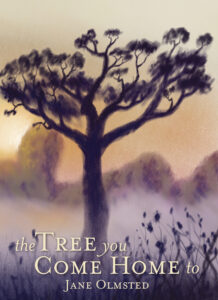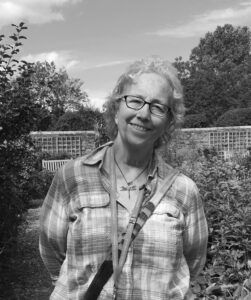 One writer’s search for meaning, one family’s journey to healing...
One writer’s search for meaning, one family’s journey to healing...
Jane Olmsted’s family didn’t adhere to the characteristics that the media portrays for those struggling with mental illness and addiction. Doctors, attorneys, and social workers repeatedly told Jane and her husband that they weren’t used to working with “families like yours.” The Tree You Come Home To tells the story of Jane’s family’s struggle with mental illness, addiction, and the crises that followed the murder of her youngest son. It can provide hope and comfort to those facing similar situations and encourage empathy and compassion in those who haven’t.
AUTHOR BIOGRAPHY
 Jane Olmsted is a professor of English at Western Kentucky University. Her collection of poetry, Seeking the Other Side, was published in 2015 (Fleur de Lis Press) and a chapbook, Tree Forms (Finishing Line Press), was published in 2011. Her poems and stories have appeared in Nimrod, Poetry Northwest, The Beloit Fiction Journal, Adirondack 2Review, and Briar Cliff Review, among others. An essay about the loss of her son, “The Weight of a Human Heart,” won the 2001 Memoir Journal grand prize for the guns issue.
Jane Olmsted is a professor of English at Western Kentucky University. Her collection of poetry, Seeking the Other Side, was published in 2015 (Fleur de Lis Press) and a chapbook, Tree Forms (Finishing Line Press), was published in 2011. Her poems and stories have appeared in Nimrod, Poetry Northwest, The Beloit Fiction Journal, Adirondack 2Review, and Briar Cliff Review, among others. An essay about the loss of her son, “The Weight of a Human Heart,” won the 2001 Memoir Journal grand prize for the guns issue.
Olmsted was born in Minneapolis and grew up in Ohio, with her mother, who was the music librarian at Oberlin College and who instilled in her a love of the arts and a political awareness of social injustice. Olmsted earned her BFA from Bowling Green State University in Ohio and her MA (University of Louisville), both in English and creative writing; she also has a PhD in English and feminist studies from the University of Minnesota.
Olmsted and her husband, Ken Casey, raised three boys in Bowling Green, Kentucky. She teaches in the English Department and he teaches philosophy and religion at a local community college. They are raising their youngest son’s daughter; another granddaughter lives in Louisville. They live almost in the country with three dogs, two cats, and innumerable fish.
WHAT REVIEWERS ARE SAYING:
A writer reflects on the violent death of her son. Each of Olmsted's three sons had their problems. The worst came from their youngest, Casey, who was in crisis from the age of 11 until his tragic murder at 20. "Casey's is a story of anguish and struggle for love and self-worth," Olmsted writes, "but it is also one of great personal courage and determination." Working from primary sources, like notes about Casey's institutionalizations, Casey's writings, court statements, and recollections from family and friends, Olmsted reconstructs her son's short, turbulent life—his violent outbursts, struggles with drug addiction, and the birth of his daughter, which marked the beginning of a slow, more hopeful turn toward responsibility and spiritual healing. At the same time, Olmsted narrates the immense grief she, her husband, and her other sons felt after Casey's death, especially as the murder trial looms. A university English professor and poet, Olmsted outlines the various efforts made by her, doctors, therapists, and teachers to intervene in her troubled children's lives, providing meticulous analysis of how to keep moving forward in the face of the seemingly insurmountable. At the same time, she invites readers into her darkest stray thoughts while maintaining a distinct, sharp voice. (She interrupts herself at one point: "Irrational fears: Everyone I love will die. Go away, bad thought.")
Most notable, however, is her conclusion, which reflects on the need for an apology from her son's murderer. It's a standout chapter—a stunning and emotional investigation of parenting, grief, and language. An affecting examination of loss and helplessness and how they intersect.
—Kirkus Reviews
“Jane Olmsted's meticulously detailed account is a wake-up call for schools, churches, social workers, legislators, psychologists, medical doctors, and all those engaged with the mental and emotional wellness of at-risk youth.”
—Sena Jeter Naslund, Ph.D., author of Ahab's Wife and others
“Jane Olmsted weaves together life and death, tragedy, and moments of grace in this extraordinary memoir on the murder of her youngest son. In luminous writing, Olmsted plumbs the complex and fluctuating dynamics of family, motherhood, grief, and faith while forging a path towards healing.”
—Kristin Czarnecki, author of The First Kristin: The Story of a Naming
